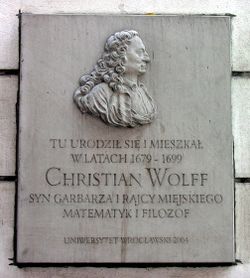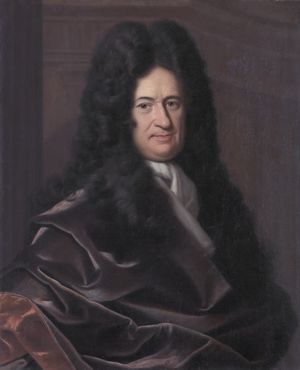كريستيان ڤولف (فيلسوف)
Christian Wolff (less correctly Wolf, ألمانية: [vɔlf]; also known as Wolfius; ennobled as Christian Freiherr von Wolff in 1745; 24 January 1679 – 9 April 1754) was a German philosopher. Wolff was the most eminent German philosopher between Leibniz and Kant. His main achievement was a complete oeuvre on almost every scholarly subject of his time, displayed and unfolded according to his demonstrative-deductive, mathematical method, which perhaps represents the peak of Enlightenment rationality in Germany.
Wolff was also the creator of German as the language of scholarly instruction and research, although he also wrote in Latin, so that an international audience could, and did, read him. A founding father of, among other fields, economics and public administration as academic disciplines, he concentrated especially in these fields, giving advice on practical matters to people in government, and stressing the professional nature of university education.
. . . . . . . . . . . . . . . . . . . . . . . . . . . . . . . . . . . . . . . . . . . . . . . . . . . . . . . . . . . . . . . . . . . . . . . . . . . . . . . . . . . . . . . . . . . . . . . . . . . . . . . . . . . . . . . . . . . . . . . . . . . . . . . . . . . . . . . . . . . . . . . . . . . . . . . . . . . . . . . . . . . . . . . .
Life

الفلسفة
Christian Wolff redefined philosophy as the science of the possible, and applied it in a comprehensive survey of human knowledge to the disciplines of his time. Wolffian philosophy has a marked insistence everywhere on a clear and methodic exposition, holding confidence in the power of reason to reduce all subjects to this form. He was distinguished for writing copies in both Latin and German. Wolff's teachings held virtually undisputed sway in Germany till the Kantian revolution, and even after that, Wolff continued to be regarded as one of the most important philosophers from German-speaking lands.
Works
Wolff's most important works are as follows:
- Dissertatio algebraica de algorithmo infinitesimali differentiali (Dissertation on the Algebra of Solving Differential Equations Using Infinitesimals; 1704)[4]
- Anfangsgründe aller mathematischen Wissenschaften (1710); in Latin, Elementa matheseos universae (1713–1715)
- Vernünftige Gedanken von den Kräften des menschlichen Verstandes (1712). French translation by Jean Des Champs, Logique, Berlin: 1736. English translation by anonymous, Logic, London: 1770. Unfortunately, the English version is a translation of Des Champs's French edition instead of the original German of Wolff's Vernünftige Gedanken.
- Vern. Ged. von Gott, der Welt und der Seele des Menschen, auch allen Dingen überhaupt (1719)
- Vern. Ged. von der Menschen Thun und Lassen (1720)
- Vern. Ged. von dem gesellschaftlichen Leben der Menschen (1721)
- Vern. Ged. von den Wirkungen der Natur (1723)
- Vern. Ged. von den Absichten der natürlichen Dinge (1724)
- Vern. Ged. von dem Gebrauche der Theile in Menschen, Thieren und Pflanzen (1725); the last seven may briefly be described as treatises on logic, metaphysics, moral philosophy, political philosophy, theoretical physics, teleology, physiology
- Philosophia rationalis, sive logica (1728)
- Philosophia prima, sive Ontologia (1730)
- Cosmologia generalis (1731)
- Psychologia empirica (1732)
- Psychologia rationalis (1734)
- Theologia naturalis (1736–1737)
- Kleine philosophische Schriften, collected and edited by G.F. Hagen (1736–1740).
- Philosophia practica universalis (1738–1739)
- Jus naturae and Jus Gentium. Magdeburg, 1740–1748.
- English trans.: Marcel Thomann, trans. Jus naturae. NY: Olms, 1972.
- Jus Gentium Methodo Scientifica Pertractum (The Law of Nations According to the Scientific Method) (1749)
- Philosophia moralis (1750–1753).
Wolff's complete writings have been published since 1962 in an annotated reprint collection:
- Gesammelte Werke, Jean École et al. (eds.), 3 series (German, Latin, and Materials), Hildesheim-[Zürich-]New York: Olms, 1962–.
This includes a volume that unites the three most important older biographies of Wolff.
An excellent modern edition of the famous Halle speech on Chinese philosophy is:
- Oratio de Sinarum philosophia practica / Rede über die praktische Philosophie der Chinesen, Michael Albrecht (ed.), Hamburg: Meiner, 1985.
See also
Notes
References
- ^ أ ب Robert Theis, Alexander Aichele (eds.), Handbuch Christian Wolff, Springer-Verlag, 2017, p. 442.
- ^ أ ب ت Brady Bowman, Hegel and the Metaphysics of Absolute Negativity, Cambridge University Press, 2013, p. 66.
- ^ David E. Cartwright, Schopenhauer: A Biography, Cambridge University Press, 2010, p. 192 n. 41.
- ^ Available online on Göttinger Digitalisierungszentrum.
Sources
- Blackwell, Richard J. "Christian Wolff's Doctrine of the Soul," Journal of the History of Ideas, 1961, 22: 339–354. in JSTOR
- Corr, Charles A. "Christian Wolff and Leibniz," Journal of the History of Ideas, April 1975, Vol. 36 Issue 2, pp 241–262 in JSTOR
- Goebel, Julius, "Christian Wolff and the Declaration of Independence", in Deutsch-Amerikanische Geschichtsblätter. Jahrbuch der Deutsch-Amerikanischen Gesellschaft von Illinois 18/19 (Jg. 1918/19), Chicago: Deutsch-Amerikanische Gesellschaft von Illinois, 1920, pp. 69–87, details Wolff's impact on the Declaration of Independence.
- Jolley, Nicholas, ed. The Cambridge Companion to Leibniz (Cambridge University Press, 1995), the standard source in English; includes biography and details of his work in many fields
- Richards, Robert J. "Christian Wolff's Prolegomena to Empirical and Rational Psychology: Translation and Commentary," Proceedings of the American Philosophical Society Vol. 124, No. 3 (30 Jun. 1980), pp. 227–239 in JSTOR
- Vanzo, Alberto. "Christian Wolff and Experimental Philosophy", Oxford Studies in Early Modern Philosophy 7.
- European Journal of Law and Economics 4(2) (Summer 1997), special issue on Christian Wolff, reprinted 1998 in the Gesammelte Werke, 3rd Ser. Note especially the essays by Jürgen G. Backhaus ("Christian Wolff on Subsidiarity, the Division of Labor, and Social Welfare"), Wolfgang Drechsler ("Christian Wolff (1679–1754): A Biographical Essay"), Erik S. Reinert and Arno Mong Daastøl ("Exploring the Genesis of Economic Innovations: The religious Gestalt-Switch and the Duty to Invent as Preconditions for Economic Growth"), and Peter R. Senn ("Christian Wolff in the Pre-History of the Social Sciences").
- This article incorporates text from a publication now in the public domain: Chisholm, Hugh, ed. (1911). . دائرة المعارف البريطانية. Vol. 28 (eleventh ed.). Cambridge University Press.
{{cite encyclopedia}}: Cite has empty unknown parameter:|coauthors=(help)
External links
- مقالات المعرفة المحتوية على معلومات من دائرة المعارف البريطانية طبعة 1911
- Wikipedia articles incorporating text from the 1911 Encyclopædia Britannica
- Use dmy dates from April 2012
- 1679 births
- 1754 deaths
- أشخاص من ڤروتسواف
- People from Austrian Silesia
- فلاسفة التنوير
- Barons of Germany
- فلاسفة ألمان
- لوثريون ألمان
- Leipzig University faculty
- University of Halle faculty
- طاقم تدريس جامعة ماربورگ
- Barons of the Holy Roman Empire
- أعضاء أكاديمية العلوم الفرنسية
- زملاء الجمعية الملكية
- أعضاء فخريون في أكاديمية العلوم بسانت پطرسبورگ
- 18th-century German writers
- فلاسفة القرن 18
- German male writers
- خريجو جامعة ينا


